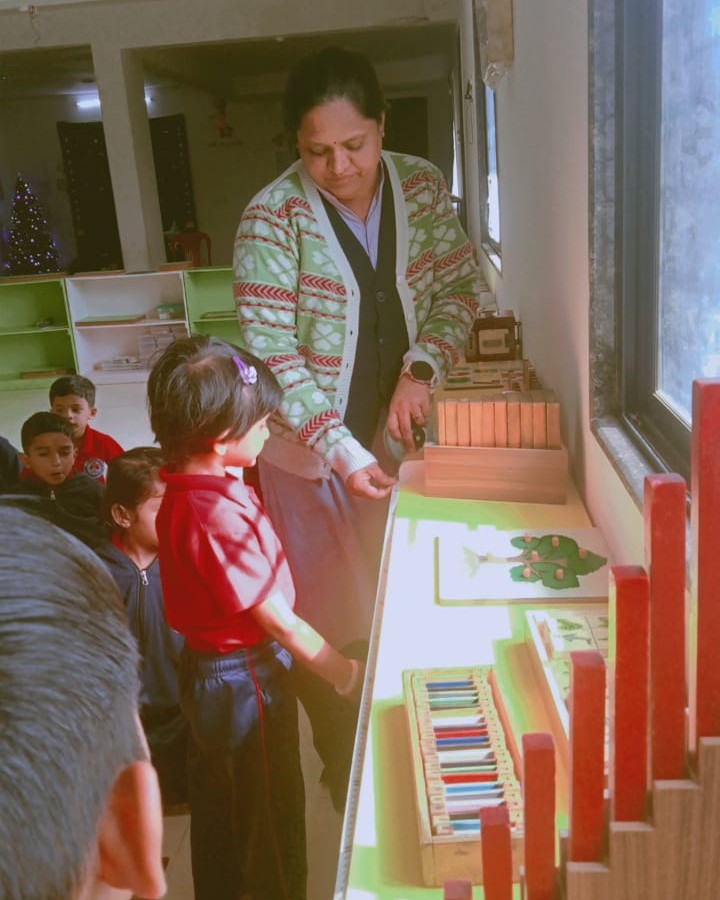Tomoae Montessori House of Children
The Importance of Montessori Education:
A Journey of
Nurturing Independence, Creativity, and Discipline
While both of my children excel in their studies, my Montessori-educated daughter stands out in remarkable ways. She approaches problems differently, thinks outside the box, makes her own decisions, and demonstrates a level of independence that far surpasses what I observe in my child attending a traditional school. In today’s world, especially in India, where we are in need of a disciplined, well-rounded, and creative generation, Montessori education is more relevant than ever. This blog will explore why Montessori education is vital in shaping a future generation that is not only academically successful but also independent, disciplined, and innovative.
1. The Power of Independent Thinking
As a Montessori teacher, I have always believed that education should be about fostering independent thinking, and this philosophy is embodied in the Montessori method. The child in a Montessori classroom is encouraged to take ownership of their learning. They are given the freedom to explore topics of interest, choose their activities, and solve problems on their own.
2. Creative Problem-Solving and Innovation
One of the greatest strengths of Montessori education is its emphasis on creativity. Children in Montessori classrooms are not confined to textbooks or traditional methods of learning. Instead, they have access to hands-on materials that encourage experimentation, critical thinking, and creativity. As India is moving towards a more dynamic and rapidly evolving future, creativity and innovative thinking will be crucial. Montessori education nurtures these qualities from an early age, ensuring that children are not just prepared to follow the world but to shape it.
3. Building Discipline through Freedom and Responsibility
Discipline is often perceived as something that is imposed from outside—rules and restrictions that children must follow. However, Montessori education teaches children to develop self-discipline through the balance of freedom and responsibility. In a Montessori classroom, children have the freedom to choose their activities, but with this freedom comes the responsibility to manage their time, complete tasks, and respect others. In a world that demands high levels of self-control and organization, especially as the demands on children’s time increase, Montessori education provides the tools to cultivate self-discipline in a meaningful and lasting way.
4. A Love for Learning
One of the most important gifts that Montessori education offers is a love for learning. Unlike traditional schools, where children may be passive recipients of information, Montessori children are actively engaged in their learning process. They are encouraged to explore, question, and discover at their own pace, which fosters a deep curiosity about the world around them. In India, where the education system often focuses on rote memorization and exam-driven outcomes, Montessori education offers a refreshing alternative—one that encourages children to develop a lifelong passion for learning.
5. Instilling Social and Emotional Intelligence
6. Preparing Children for the Future
As a Montessori teacher, I am proud to see how this method prepares children for the future. In India, where the need for a disciplined, innovative, and responsible generation is more urgent than ever, Montessori education stands as a beacon of hope. The children who grow up in Montessori environments are not only academically strong but also independent, creative, and self-disciplined individuals capable of tackling the challenges of the modern world.
Conclusion: Montessori Education for a Disciplined, Creative Generation
As we face an increasingly complex world, it is crucial to provide children with an education that prepares them to think critically, act independently, and work collaboratively. Montessori education, with its focus on freedom, responsibility, creativity, and emotional intelligence, offers the perfect framework to cultivate these qualities. Through my personal experience as both a Montessori teacher and a mother, I have seen how Montessori education nurtures a disciplined, independent, and creative generation of children who are ready to take on the world. If we want to shape a future generation that is not only academically successful but also emotionally intelligent, innovative, and responsible, Montessori education is the way forward. In India, where the need for such well-rounded individuals is more important than ever, it is time to embrace Montessori education as a powerful tool to shape the leaders, thinkers, and change-makers of tomorrow.
Tomoae Montessori House Of Children



Comments
Post a Comment